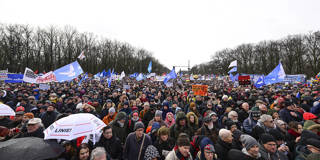A year after Russia’s invasion of Ukraine, Germans are still debating what role they should play in the war, and what the goal should be. Yet by focusing so much on Germany’s internal strategic evolution, they risk missing the bigger picture.
BERLIN – Two months after Russia’s invasion of Ukraine last year, Jürgen Habermas, perhaps Germany’s leading public intellectual, published a commentary that triggered one of the country’s most ferocious political debates in decades. Habermas asked how Germany should position itself in the widening Russian-Ukrainian war. Germans still haven’t reached any agreement on an answer.
At the start of the war, German Chancellor Olaf Scholz was subject to a barrage of open letters, each signed by hundreds of leading public figures. Some took a hawkish position, advocating more forceful and active engagement on Ukraine’s behalf. Others were dovish, pushing for a settlement that would permit Russia to claim some kind of victory and spare Europe from a widening and prolonged conflict. Habermas rejected both the bellicosity of the former and the naive pacifism of the latter. Instead, he supported Scholz’s cautious approach, which seemed – at the time – to hold the most promise for a just peace settlement.
Since then, Russia’s war on Ukraine’s civilian population has intensified, and Germany has expanded its military and financial support for Ukraine to a level that would have been unthinkable last spring. But one year after the invasion, divisions are appearing within Scholz’s coalition government, and open letters are pouring in again.

BERLIN – Two months after Russia’s invasion of Ukraine last year, Jürgen Habermas, perhaps Germany’s leading public intellectual, published a commentary that triggered one of the country’s most ferocious political debates in decades. Habermas asked how Germany should position itself in the widening Russian-Ukrainian war. Germans still haven’t reached any agreement on an answer.
At the start of the war, German Chancellor Olaf Scholz was subject to a barrage of open letters, each signed by hundreds of leading public figures. Some took a hawkish position, advocating more forceful and active engagement on Ukraine’s behalf. Others were dovish, pushing for a settlement that would permit Russia to claim some kind of victory and spare Europe from a widening and prolonged conflict. Habermas rejected both the bellicosity of the former and the naive pacifism of the latter. Instead, he supported Scholz’s cautious approach, which seemed – at the time – to hold the most promise for a just peace settlement.
Since then, Russia’s war on Ukraine’s civilian population has intensified, and Germany has expanded its military and financial support for Ukraine to a level that would have been unthinkable last spring. But one year after the invasion, divisions are appearing within Scholz’s coalition government, and open letters are pouring in again.